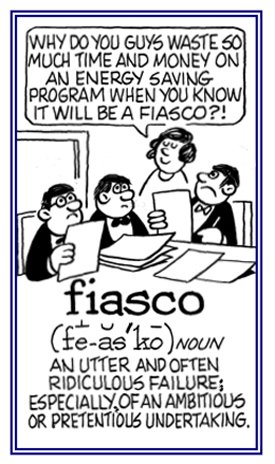2. A complete and ignominious lack of success to accomplish something: Bill’s efforts to get to the job interview on time became a fiasco when the subway train, on which he relied, stalled in the tunnel.
3. A sudden and violent collapse: The financial failure of the insurance company was a fiasco which no one had anticipated.
4. Etymology: from about 1855, theater slang for "a failure". By about 1862, it acquired the general sense of any "dismal flop", on or off the stage; which may have resulted via a French phrase fiare fiasco, "to turn out a failure", from Italian far fiasco, "suffer a complete breakdown in performance"; or literally, "make a bottle"; from fiasco, "bottle", from medieval Latin flasco which is the source of English flagon and flask.
Fiasco was adopted into English in the late nineteenth century in its newly acquired sense of an "utter and often ridiculous failure".
The reason for all this is unclear today; but "the usual range of fanciful theories has been advanced for the origin of the usage, but none is particularly convincing" according to John Ayto in his Dictionary of Word Origins.
Dr. Ernest Klein in his Klein's Comprehensive Etymological Dictionary of the English Language suggests that "the Venetian glass-makers used only perfectly flawless material for the articles manufactured by them. If in the course of their work the glass showed any flaw, they set it aside to make of it a fiasco, a common bottle or flask."
According to an Italian dictionary, "fare il fiasco once meant, "to play a game so that the one that lost would have to pay the fiasco", in other words, he would buy the next bottle (of wine). That could be one reason for the connection of the word with the notion of "a costly mistake". This idea is presented by Douglas Harper in his Online Etymology Dictionary.


